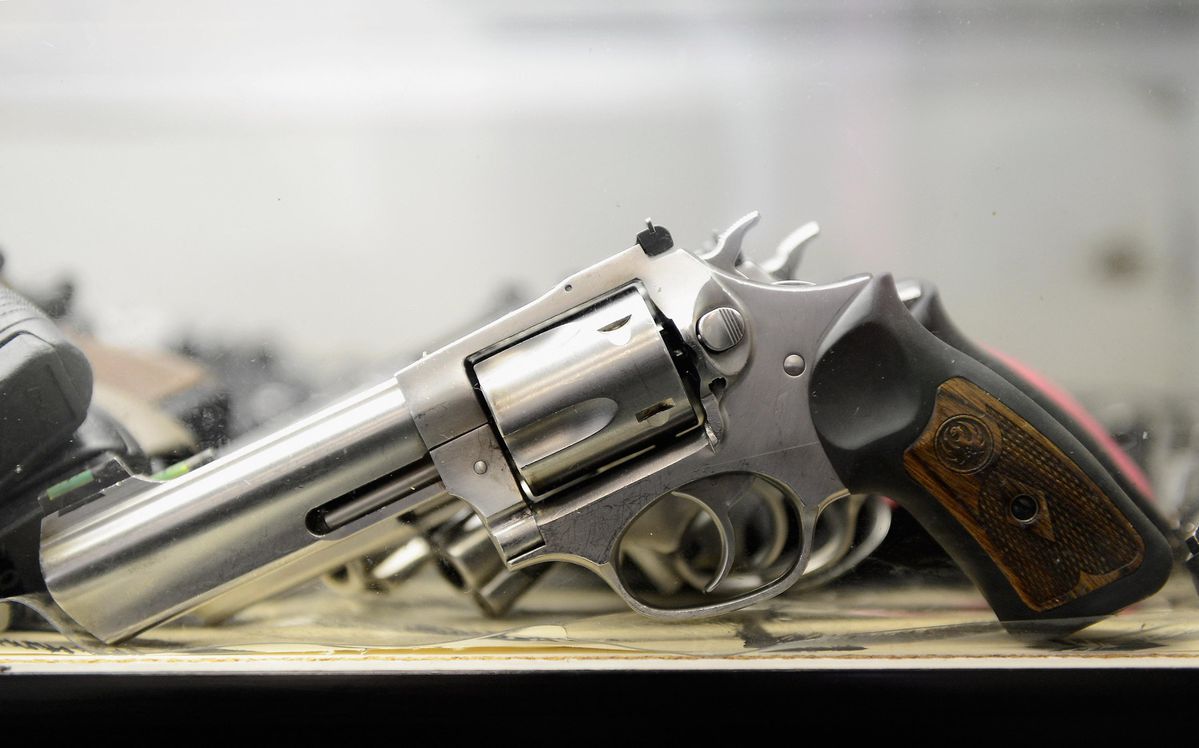[ad_1]
Topline
While gun sales have surged in the U.S. since the Covid pandemic erupted, shares of major gun manufacturers have generally stalled since last summer, possibly because investors see limited upside in a Biden administration.

LOS ANGELES, CA – DECEMBER 07: A Sturm, Ruger & Co. 357 magnum revolver is displayed for customers … [+]
Key Facts
The National Shooting Sports Foundation (NSSF), the trade association for the firearms industry, said 21 million background checks were conducted for the sale of a firearm last year, a 60% surge from 2019, and well above the prior record of 15.7 million background checks in 2016.
Shares of major gunmaker Sturm, Ruger & Co. more than doubled from August 2019 to August 2020 – but have since dropped about 21%, although the company’s net sales jumped by 39% in 2020 from the prior year.
Another prominent gunmaker, Smith & Wesson, saw its shares quintuple in value from September 2019 to August 2020 – but the stock has floundered since, slipping about 10%, even as its gun sales doubled in its fiscal third quarter.
Investors appeared to have begun taking profits on firearm stocks in September of last year, when background checks dipped slightly, after record-breaking new gun applications in the prior two months.
David Trainer, CEO of New Constructs, an investment research firm based in Nashville, Tenn., says the stocks of some big gunmakers have stalled since last summer because “investors do not see the unusually high sales continuing and [because] the [gun] market is becoming saturated.”
Key Background
NSSF estimated that 8.4 million people were first-time gun-buyers last year, accounting for about 40% of all purchases. Guns have flown off the shelves in the beginning of 2021 as well. The FBI reported that 3.44 million background checks for gun sales were conducted in February, down from a record of 4.31 million in January – but both months recorded higher checks than in comparable periods last year. Justin Anderson, director of marketing at Hyatt Guns in Charlotte, N.C., thinks “fear” was one of the primary drivers of gun sales last year, as a combination of factors led to record gun sales that are continuing: Covid-19, political unrest, and riots throughout the U.S. “Further adding to demand is the election of President Biden, who has made it clear that he wants to limit people’s gun rights,” he says. “Uneasiness over gun laws will likely continue to add to the growth in the gun sector.” (Anderson cautions that the FBI doesn’t release statistics on how many background checks were denied. “In our case, very few background checks get denied, and of those denials, many are appealed,” he adds.) The market for guns is also now more diverse — of new gun-buyers in 2020, 40% were women, while the proportion of Black gun purchasers jumped by 58% over the prior year. Gun sales were also boosted by federal action — last March, the Trump administration deemed gun stores, gun makers and shooting ranges as “essential” and “critical” businesses that should remain open during pandemic. But Trainer of New Constructs thinks gun sales will slow down soon as the lockdown ends and that the valuation of gun company shares may have peaked “as there is a greater chance of regulatory headwinds for guns sales under the Biden administration.” Trainer adds that gunmakers might also be hurt by the refusal of some institutional investors and pension funds to invest in these companies. “Investors are more [environmental, social, and corporate governance] conscious than ever — gun stocks may be considered ‘vice’ stocks by many investors,” he says.
Tangent
As gun sales surge, the industry faces a shortage of ammunition. Anderson of Hyatt Guns explains the current shortage was caused by enormous demand from new gun owners last year. “Combine that with many people hoarding ammunition during the pandemic, as well as shortages of powder, primers, brass, and lead due to Covid-related business shutdowns and we have a major shortage that continues to this day,” he says. Anderson adds that while the ammo shortage has not led his company to limit gun sales, his firm has nonetheless begun rationing ammunition to ensure they have enough to sell with new gun purchases. “We also halted online ammunition sales several months ago,” he adds. Mark Oliva, director of public affairs at NSSF, says 8.4 million new gun owners last year created an “incredible influx” of demand. If each of those 8.4 million new gun owners bought just one box of 50 cartridges, Oliva notes, that would equate to 420 million extra cartridges to meet that demand. Oliva also said there have been “widespread reports” of retailers who are limiting quantities of sale to guarantee they can spread limited supplies to as many customers as possible.
Further Reading
Gun Sales Finally Decelerate To Strongest February Ever, Based On FBI Background Check Data (Forbes)
Colorado Shooting Renews Pressure On Biden To Deliver Gun Control Reform (Forbes)
[ad_2]
